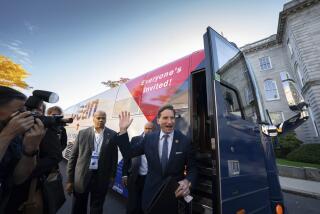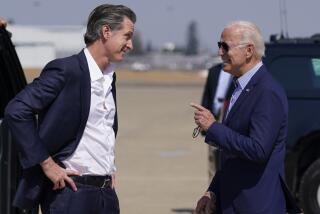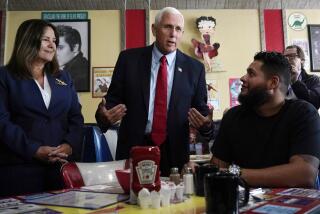Tsongas Riding High With His Low-Key Style
- Share via
NASHUA, N.H. — The nondescript silver-gray Chevy sedan carrying Democratic presidential hopeful Paul E. Tsongas slips across the state line 13 miles from his white frame home in Lowell, Mass., for another day of campaigning in New Hampshire. It is his 38th trip to the Granite State so far this year, and the months of tedious politicking are beginning to pay off.
Paul Tsongas is riding high, to the surprise of his critics and himself alike.
Written off as a hopeless long shot when he first hit the campaign trail last March, the dour, 50-year-old former U.S. senator from Massachusetts has become the party’s front-runner in New Hampshire. A new survey by the Boston Globe shows that if the primary were held now, Tsongas would run neck-and-neck with New York Gov. Mario M. Cuomo. Without Cuomo, he is 10 points ahead of his nearest competitor.
“Things are going very well in New Hampshire,” exults Dennis Kanis, Tsongas’ campaign manager.
For Tsongas, a good showing here is especially critical. Little known outside New England, he concedes that he must do well in the Feb. 18 primary or be consigned to political oblivion. “If I don’t finish in the top three, there’s no point in going on,” he admits.
So far, party professionals say, the campaign appears to be going remarkably well. Tsongas has assembled what is widely acknowledged as the state’s most extensive grass-roots organization among the Democrats. He has raised just over $1 million nationwide--more than any of his rivals. And his central theme--that the United States had better shore itself up and prepare to compete more effectively--has been sharpened by the continuing economic slump.
“It’s going far better than anyone would have expected,” says Joe Grandmaison, former state Democratic chairman and one of New Hampshire’s veteran candidate-watchers. “Anyone who meets him is taken aback by how thoughtful and deliberate he is.”
But political strategists caution against reading too much into Tsongas’ current position. As a longtime politician from a neighboring state, he began with higher name recognition than the other Democratic candidates, most of whom have yet to campaign intensively in New Hampshire. And Cuomo--who would instantly consign Tsongas to runner-up status--has been edging closer to entering the race.
Also, a style that Grandmaison calls thoughtful and deliberate is described by others as dull and disjointed. Although Tsongas occasionally can be forceful, he usually is a less-than-electric speaker, dispensing his message in incomplete fits and starts that barely even qualify as television sound-bites.
At a recent session at Plymouth State College, Tsongas blunted the initial impact of his remarks by repeatedly fidgeting with the microphone--apparently unnecessarily--during the first five minutes of his speech. “Can you hear me all right?” he asked, his eyes darting around the auditorium. Often, there were long pauses, punctuated by a rhetorical “OK?”
And then there are the charts. Tsongas almost always relies on them, drawing curves and graphs on blackboards, easels, pamphlets or table napkins--whatever is handy--to explain his views. One graph, comprising a pair of wavy lines, depicts his vision of the long-term problem with the economy, while another--a series of vertical rectangles intended to represent dominoes--chronicles the impact of the early-1980s decline in manufacturing in depressing the rest of the economy.
He also frequently refers to the 86-page booklet he has written explaining his policies. The campaign has printed 90,000 copies of the pamphlet, entitled “A Call to Economic Arms.” Asked for his views on an issue, Tsongas starts to reply, then says: “It’s in the book.”
Moreover, his single-issue theme is a complex one: Tsongas contends that the economy is not merely in a temporary slump, it is in a long-term decline resulting from America’s failure to stay competitive with Germany and Japan. To help reverse the situation, he proposes a wide array of undramatic prescriptions, from revamping the nation’s tax laws--so as to channel more money into long-term investment in manufacturing--to easing antitrust restrictions and increasing aid for education and research.
Partly to help carve a niche for himself, Tsongas--a liberal on everything but economic issues--has sought to distance himself from the economic policies of the rest of the Democratic candidates. He derides many of them as “ATM Democrats” who believe that they can “simply push a button and the money will start coming out,” as with an automatic teller machine.
Unlike most of the other hopefuls, he rejects suggestions for a middle-class tax cut, dismissing it as bad economics that does not address the real problem. Those proposing one are basing their moves on “what will sell, not what will work,” he sniffs.
Like President Bush, he supports cutting the tax rate for capital gains--though he would “target” the benefits by limiting the tax breaks to investments in manufacturing. Unabashedly pro-business, he eschews another recent Democratic staple--trade protectionism--contending the best way for Americans to compete more effectively is to learn to make better products, not to bar imports.
Tsongas asserts that the competitiveness issue is cutting more effectively than it did in 1988, when then-candidate Rep. Richard A. Gephardt (D-Mo.) tried to raise it. “People are scared now,” the candidate explains.
But William Schneider, political analyst for the Washington-based American Enterprise Institute, worries that with such a cerebral-sounding program, Tsongas “is in danger of becoming the Bruce Babbitt of this campaign”--a reference to the ex-governor of Arizona, whose detailed program won praise in the ’88 presidential campaign, but few actual votes.
“If the primary were held among the press, (Tsongas) would win tomorrow,” Schneider says. “The press sees Tsongas as a truth-teller. That gets him a lot of respect, but doesn’t move Democrats.”
Some party pros also question whether Tsongas’ campaign organization, adequate for the groundbreaking days in New Hampshire, is ready for the rough-and-tumble of a national campaign. While energetic and adoringly loyal, Tsongas’ 42-person paid staff--supplemented by dozens of college-age volunteers--is largely youthful and inexperienced. His self-imposed ban on accepting contributions from political action committees is likely to make fund raising difficult. And his single-issue campaign strategy has been largely untested outside of New Hampshire. “We’re Johnny-one-note--economic truth, economic hope,” Tsongas concedes.
Another Tsongas disadvantage is an unnerving similarity to former Massachusetts Gov. Michael S. Dukakis, whose 1988 loss to Bush in the general election made him a political pariah among Democrats. Not only are both men Greek-Americans from Massachusetts, liberals on most issues and uninspiring on the podium, but they share a hint of haughtiness. Tsongas regularly tells audiences he is seeking “a mandate” for his ideas. He adds that if the voters don’t like what he is advocating, “I don’t want the job.”
Always in the background, meanwhile, is his battle with cancer. Stricken with lymphoma, Tsongas quit the Senate in 1984 to combat the illness. An experimental bone-marrow procedure sent the disease into remission.
The issue cuts two ways: On one hand, Tsongas’ successful battle with cancer draws admiration from some voters. But it also causes some to question how fit he is to run--and serve--as President. Perhaps to counter any lingering doubts, Tsongas makes much of his swimming activities--he regularly competes in amateur meets--to show he is in good health. And his physician, Boston oncologist Tak Tavorian, is eager to provide reporters with “any reports and numbers” on Tsongas’ condition. “Here’s my home telephone number,” he told journalists last week.
Tsongas’ unconventional style was evident during a recent visit to New Hampshire. At a meeting in Nashua, he sat around a table--in shirt sleeves--with job counselors and unemployed workers, patiently listening to their complaints, but only rarely commenting himself. Later that day, in Plymouth, he delivered his stock speech to students and answered a few questions, repeating the performance later for a small group of local businessmen. But the exchanges were all low-key, devoid of any ringing political rhetoric.
Perhaps as a result, audience reactions at Tsongas appearances tend to be polite, but rarely enthusiastic. His only standing ovation during a recent two-day swing came in Astoria, N.Y.--and that was among Greek-Americans, who were toasting a favorite son.
Tsongas strategists contend that most of the pieces, such as more money and more campaign workers, will fall into place if their man wins or comes in second in New Hampshire. Others are less sanguine about his prospects.
Says political analyst Schneider: “He’s a person who has overcome a lot of adversity, but he doesn’t have buoyancy. Tsongas could come out of this campaign with a lot of respect, but not many votes.”
More to Read
Get the L.A. Times Politics newsletter
Deeply reported insights into legislation, politics and policy from Sacramento, Washington and beyond. In your inbox three times per week.
You may occasionally receive promotional content from the Los Angeles Times.










